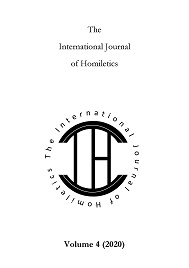Awakening to Judaism and Jews in Christian Preaching
DOI:
https://doi.org/10.21827/ijh.2020.39505Abstract
Preaching is a daring undertaking. Whether through music, sermons, reading scripture, or personal conversation, speaking of God is an interpretive act. One never quite knows how what one plays, says, writes, or depicts is received. The distance between minds is vast. And given that every set of eyes may read the same words differently and each set of ears hear each interpretive utterance differently, hoping to communicate meaningfully with those watching and listening is nothing short of audacious. Among these challenges, one of the most delicate is preaching on Judaism and Jews. Yet Christians cannot avoid it. Judaism and Christianity are one another’s nemeses. Some biblical texts lend themselves to anti-Jewish attitudes and stereotypes that may be unrecognized so deep is Christian contempt for Jews and Judaism. This paper offers suggestions for avoiding anti-Jewish preaching. To do that effectively it will be necessary to awaken a sensibility to the concern that pervades and penetrates Christian thought. That requires slogging through some “unprettiness.” The paper first illustrates anti-Jewish preaching by interrogating a popular text, Luke’s story of the Pharisee and the tax collector. It then briefly considers Christian hymns and sacred choral music and then focuses on four sermons: The Letter to the Hebrews, Melito of Sardis’s On Passover, Augustine’s sermon 122 on John 1:48-51, and a recent sermon on Galatians 3:23-29. It concludes with suggestions for preachers, musicians and congregations and includes guidelines for preaching on Jews and Judaism and a bibliography for further study.
Published
Issue
Section
Copyright (c) 2020 Ellen T. Charry

This work is licensed under a Creative Commons Attribution 4.0 International License.


